Constantinople. Part 15
Description
This section is from the book "Constantinople - John L. Stoddard's Lectures", by John L. Stoddard. Also available from Amazon: John L. Stoddard's Lectures 13 Volume Set.
Constantinople. Part 15
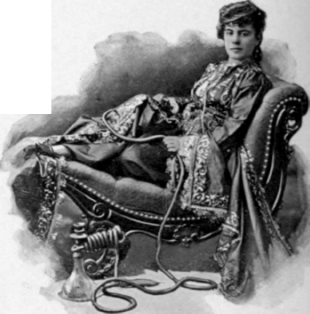
An Earthly Houri.
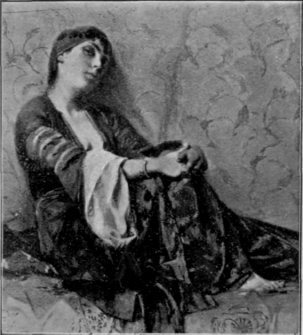
Enjoying A Siesta.
Some facts of a legal nature regarding Moslem women are not generally known. For example, a daughter, at her father's death, shares equally with a son in the estate. A Mohammedan wife has absolute possession of all property that was hers before marriage, and of all that subsequently comes to her. She can dispose of it during her lifetime, or at her death, as she pleases. She can sue and be sued, inderegards the custody of children in case of a divorce, Mohammed settled the question, thirteen hundred years ago, by saying that a son must remain with his mother as long as he requires her care; and a daughter until she is married. On the other hand, the divorce laws in the Orient put even those of South Dakota in the shade. If a Moslem husband wishes to divorce his wife, he merely has to say: "I give thee thy dowry; I divorce thee," - and the thing is done. Twice he can say this and take back his wife; but if he says it the third time, all is over. He has lost her, - at least until some other man has married and divorced her;- then he has another chance! The woman, however, has no such opportunity as this. In Constantinople the men do all the divorcing. There is no doubt, therefore, which of the sexes holds the reins in Turkey, and a Moslem could hardly appreciate the story of the American lady who said: "Ten years ago the minister made John and me one, and ever since then we have been trying to find out which one." Yet, deplorable as their lives may seem to us, we must not think that Turkish women languish in absolute seclusion. On the contrary, so far as associating with their own sex is concerned, they have great freedom. They walk or drive about at any hour of the day, - they have their pleasure-boats on the Bosporus, they travel in the steamboats, trains and horse-cars; they visit their friends; they go to the mosques; they spend hours in the baths; they shop freely in the bazaars; - in fact, they do almost everything they choose, provided they wear a mantle and are lightly veiled, and associate only with their own sex. Thus clothed and attended, they have an advantage over many Christian ladies, for they are then never subjected to the slightest insult in even the poorest quarters of the city.
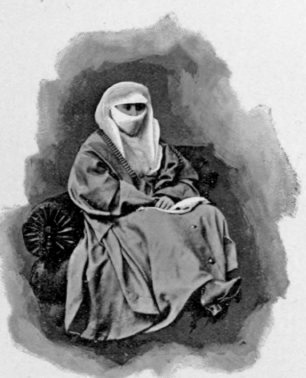
A Moslem Woman.
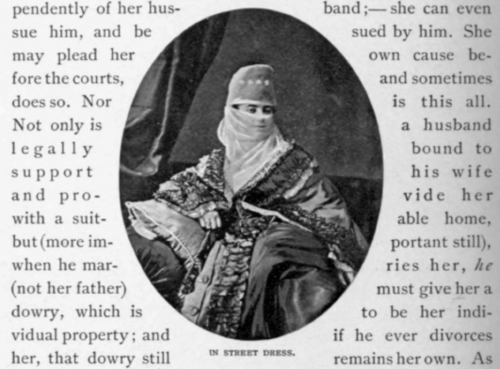
The place beloved above all others by these Eastern women is the bath-house. Many of these establishments are quite luxurious, and may be fairly called the Club Houses of the ladies of Stamboul. Here they can meet as often as they like, and gossip to their hearts' content; and so enamored are they of this dissipation, that they will sometimes bring their luncheons with them and stay all day long. In those softly tinted halls there are often gathered a hundred ladies at a time, in every stage of dress and undress, - chatting, laughing, smoking, doing fancy work, or being waited on by female slaves. And, according to the testimony of European ladies who have seen them, they present such an array of lovely forms that one could easily im. ine the sumptuous rooms thus tenanted, to be a portion of the Paradise promised to all faithful Moslems.
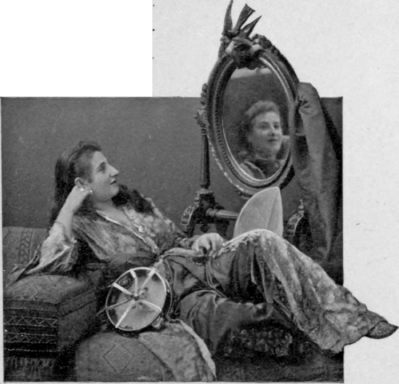
After The Bath.
With the exception of conversation, music,and reading,Oriental ladies have few indoor diversions. The Turks, of course, never give-social entertainments like our own. To them the promiscuous mingling of the sexes at a ball is abhorrent, and waltzing they no doubt consider an invention of the devil. In fact, dancing, as an amuse-ment. is something which indolent Orientals cannot comprehend. When a distinguished Moslem visited Paris, not long ago, he was invited to the house of a wealthy banker. There, to his amazement, he beheld his host indulging in a waltz. "How is it possible," he cried, "that, when he is so rich, this gentleman gives himself the trouble to dance? Why does n't he hire some one to do it for him?"
There is, however, a kind of dancing in which some followers of the Prophet are adepts. It is that practiced by the Whirling Dervishes. These men are easily recognized by their peculiar, tall, felt hats, resembling in form and color inverted flower-pots or loaves of Boston brown bread. All visitors to Constantinople come to witness their unique performances, the attendance of strangers being desired by the dervishes, without regard to their religious belief. The pres-ence of spectators probably adds to the nervous excitement, which they crave. Imagine, in the centre of a room containing galleries for visitors, an old man standing motionless, surrounded by a score or more of younger men, who have saluted him and patiently await a signal from his hand. When it is given, one of the dervishes begins to spin around like a top, resting on the heel of his right foot, while propelling himself with the left. Another quickly follows his example, then another and another, until the entire company is in motion. The skirts of their long robes, belted at the waist, soon stand out from their bodies like so many bells, and keep their shape as steadily as if cast in bronze. Meantime the pose of each of the dancers is identical. The head droops to one side, the arms are extended, the right hand is raised aloft with upturned palm, as if to claim the blessing of Allah, the left hand lowered with the palm inverted, in token that what they thus receive they will hand down to others. Round and round they go, not in one place alone, but circling slowly through the hall, as planets turn on their own axes, while revolving about a central sun. But, though the eyes of the whirlers were half-closed, we never saw the least collision of even one robe with another. Meanwhile an orchestra of flutes and tambourines kept up a weird, monotonous music, which gradually grated on our nerves, and made us restless and excited. The dancers were much more affected by it, and as its measures grew more rapid, they seemed to lose all consciousness of their surroundings, revolving with increased velocity, - a smile of ecstasy upon their parted lips. No doubt they thus experience a vertigo which has a temporary effect upon the brain like that of intoxication. Hut though their revolutions were continued for an hour, with scarcely an instant's pause, we saw no dervish fall from the ranks, nor were they finally any more affected than to stagger slightly at the conclusion of their exhausting work.
Continue to:


